#(8) langston hughes
Explore tagged Tumblr posts
Text













1 & 2. game shows touch our lives by the mountain goats | 3 & 4. goodbye by cage the elephant | 5. game shows touch our lives by the mountain goats | 6. just one yesterday by fall out boy | 7. jesus christ by brand new | 8. for the widows in paradise, for the fatherless in ypsilanti by sufjan stevens | 9. no hard feelings by the avett brothers | 10. john 15:13 | 11. learning how to die by jon foreman | 12. nothing fades like the light by orville peck | 13. amen by amber run | 14. goodbye by cage the elephant | 15. futile devices by sufjan stevens | 16. john my beloved by sufjan stevens | 17. devil's backbone by the civil wars | 18. the iliad trans. emily wilson | 19. "the thing is" by ellen bass | 20. woke up new by the mountain goats | 21. john 11:35 | 22. heartbreaker by autoheart | 23. he was a friend of mine - traditional american folk song | 24. the predatory wasp of the palisades is out to get us! by sufjan stevens | 25. "poem" by langston hughes
#trigun maximum#vash the stampede#nicholas d. wolfwood#i got volume 10'd last night and cried so hard i gave myself a headache and a sore throat#holy shit dude.#long post#webweaving#on love#on grief#trimaxposting#trigun spoilers#trigun
228 notes
·
View notes
Text
welcome to the 2023 tumblr poetry smackdown
tumblr has developed something of a canon of poetry over the past couple years, and i figured others might enjoy getting a chance to voice their opinions on a few of those poems! poems i chose for the poetry smackdown had to be more or less widely read on tumblr (generally 10k+ notes, most with more or spread across compilations), and relatively short so as to make voting easier. they also had to be complete—there are a lot of popular lines floating around on tumblr that are excerpted from very long poems and/or poems that are inaccessible via internet, and those aren't included here. a handful of poets are represented here twice reflecting my sense of their popularity, but i arranged the bracket in such a way that it won't be able to stay that way past round 2 at the latest. if i missed a poem that is super popular i'm sorry, that said the bracket is staying as is because this was a shit ton of work to put together and i don't want to. ty.
you can get to the polls by following the links below or going to the #round1 tag on my blog. you can also send me propaganda if you want via ask and i'll post it/add it to the next round's post if the poem wins.
happy voting!
sincerely amelia @poetriarchy :)

ROUND 1: ENDS JULY 17 at 6pm EDT
"The Two-Headed Calf" by Laura Gilpin vs. "Butter Dish" by Leonard Cohen (cow poems)
"Poem" by Langston Hughes vs. "A Meeting" by Wendell Berry
"Miss you. Would like to grab that chilled tofu we love." by Gabrielle Calvocoressi vs. "My Sister, Who Died Young, Takes Up The Task" by Jon Pineda
"Hammond B3 Organ Cistern" by Gabrielle Calvocoressi vs. "Hong Kong" by Sue Zhao
"someone will remember us" (fragment by Sappho trans. Anne Carson) vs. "Wait" by Faraj Bou al-Isha trans. Khaled Mattawa
"The Quiet World" by Jeffrey McDaniel vs "Invisible Fish" by Joy Harjo
"Want" by Joan Larkin vs. "Come, and Be My Baby" by Maya Angelou
"Swan" by Mary Oliver vs. "How I Go to the Woods" by Mary Oliver
"The Orange" by Wendy Cope vs. "The Tenor of Your Yes" by Mary Ruefle
"Here There Are Blueberries" by Mary Syzbist vs. "Instructions on Not Giving Up" by Ada Limón
"To The Young Who Want to Die" by Gwendolyn Brooks vs. "A Litany for Survival" by Audre Lorde
"Night Walk" by Franz Wright vs. "Meditations in an Emergency" by Cameron Awkward-Rich
"Summer Was Forever" by Chen Chen vs. "I'm not a religious person but" by Chen Chen
"How to Be a Dog" by Andrew Kane vs. "Scheherazade" by Richard Siken
"I'm going to Minnesota where sadness makes sense" by Danez Smith vs. "Dream Song 29" by John Berryman
"Having a Coke with You" by Frank O'Hara vs. "Having 'Having a Coke with You' with You" by Mark Leidner
ADDENDUM: at 6pm on July 17th (or possibly a day earlier if there's already a clear sweep), I will be releasing a one-day poll that will give voters the option to sub in "Wild Geese" by Mary Oliver for the winner of matchup #8: "Swan" vs. "How I Go to the Woods". this is to help correct my significant oversight when I was remembering which two Oliver poems I've seen most on tumblr, and it's the only time I'm doing this kind of thing, so don't suggest it for any other poems after this please. that said, a sincere ty to @darkcomedies for first bringing its absence to my attention! and keep an eye out for this extra poll which i am calling ROUND 1.5: A HAIL MARY (OLIVER)
1K notes
·
View notes
Text
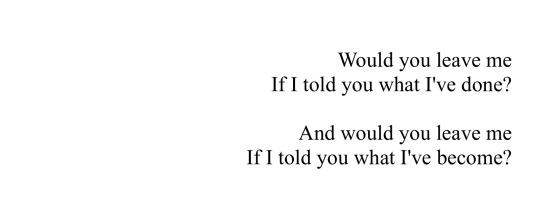




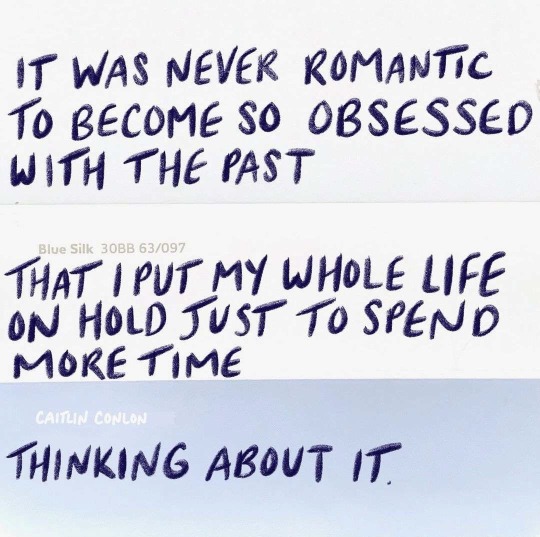




returning home
no light no light, florence + the machine / gallant, v.e schwab / @arunima / where does the temple begin, where does it end? mary oliver / @doomed-bythe-narrative / caitlin conlan / @wolfythewitch / tired, langston hughes / hum hum, mary oliver / nine lives, ursula k le guin
[Image description: a collection of ten texts mostly on white backgrounds.
1: “Would you leave me / If I told you what I've done?
And would you leave me / If I told you what I'd become”
2: “Perhaps you are haunting me. / What a comforting thought. / Maybe it's you in the darkness. / I swear I've seen it move.” The first two lines are highlighted in pale green.
3: “in summer wounds fester and in winter they ache. another one of life's classic no win scenarios”
4: “I look; morning to night / I am never done with looking.”
5: “some people are taking “doomed” to mean “dead”. this is actually a misconception! you can be doomed even if you don't die! it's sometimes worse if you don't die!”
6: “It was never so romantic to become so obsessed with the past that I put my whole life on hold just to spend more time thinking about it.” Block capitals written in purple marker on pale blue paint chips.
7: “Constantly obsessed with the concept of a man forced to be a myth. What do you do when every step you take is embedded into the text. Every word you say prose to read. You're part of something bigger than yourself. The narrative tugs you along lime water currents. There is no time to rest, to be human. You must be great, you must be legend”
8: “I am so tired of waiting, / Aren't you / For the world to become good / And beautiful and kind?”
9: “Some wounds never vanish
Yet little by little / I learned to love my life.” The second two lines are highlighted leaf green.
10: “We're each of us alone, to be sure. What can you do but hold your hand our in the dark?” End ID. ]
#litstack#web weave#web weaving#mary oliver#personal#c: lost township#onion#they finally got back to town so clearing this from my drafts before it stops being relevant
245 notes
·
View notes
Text









(Hamnet + Mareth)
1. Suzanne Collins, The Curse of the Warmbloods / 2. Ocean Vuong, On Earth We're Briefly Gorgeous / 3. Luca Guadagnino, Call Me by Your Name / 4. Azra Tabassum, My Heart is Full of Open Windows / 5. Jason Lancaster, Missing You Comes In Waves (Tonight I'm Drowning) / 6. Unknown / 7. Tumblr user longliveuslove / 8. Langston Hughes, Poem
#the underland chronicles#gregor the overlander#hamareth#hamnet#mareth#suzanne collins#web weaving#intertextuality
43 notes
·
View notes
Text
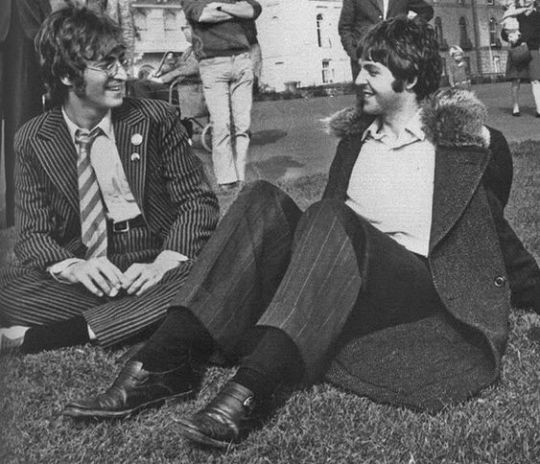
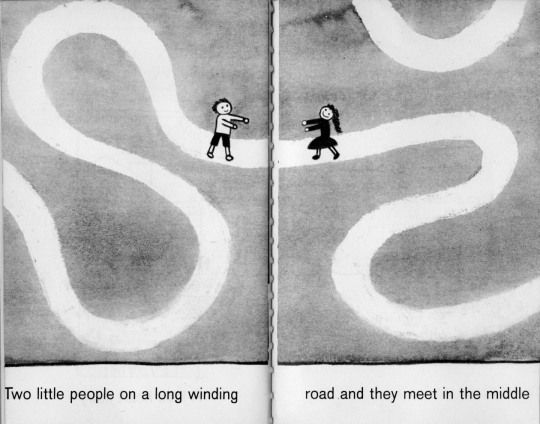
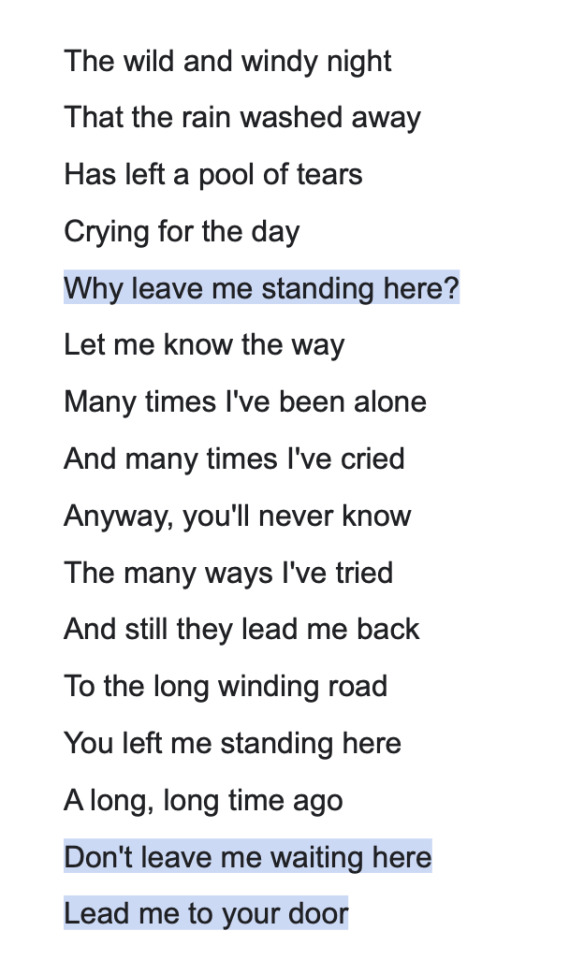
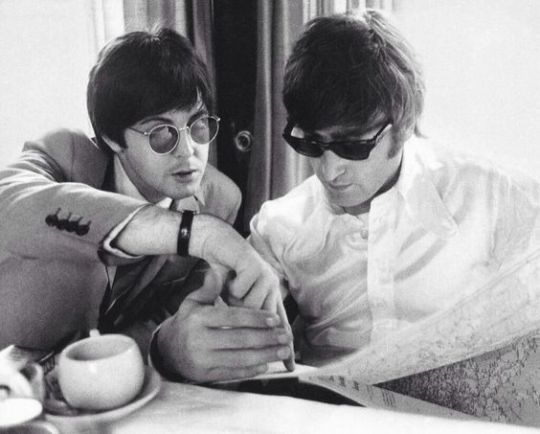
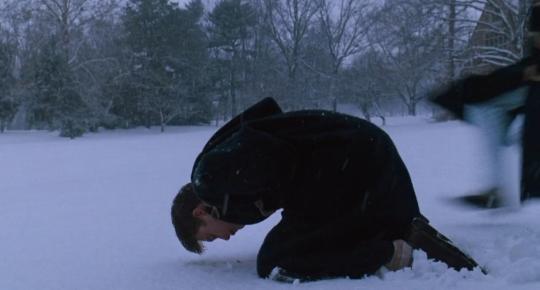
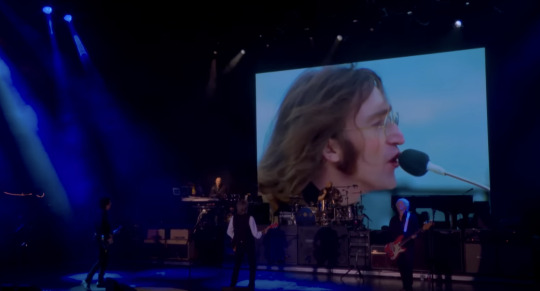
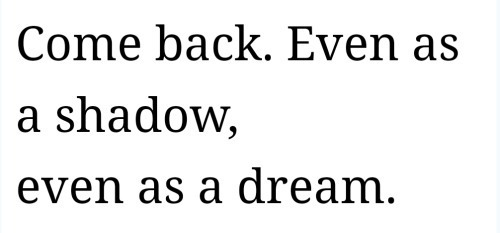
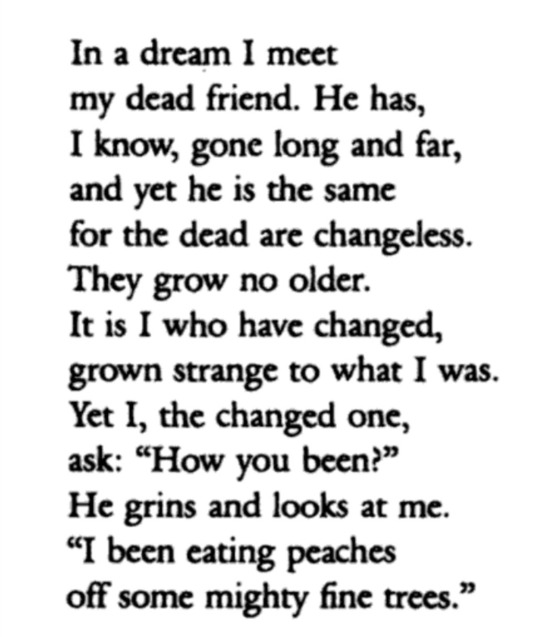
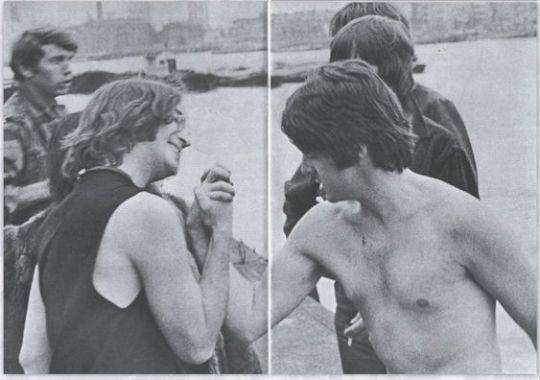


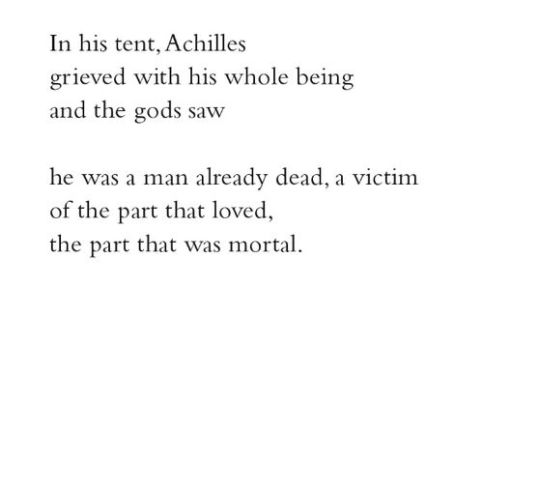

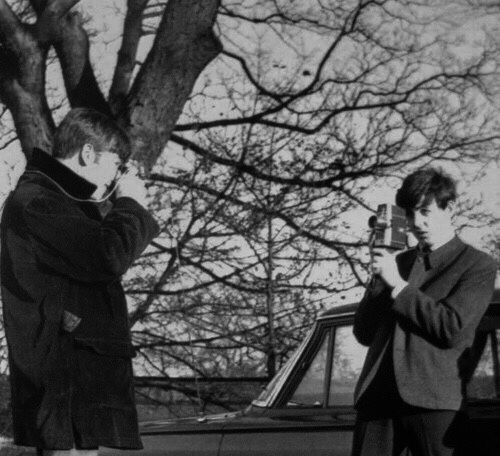
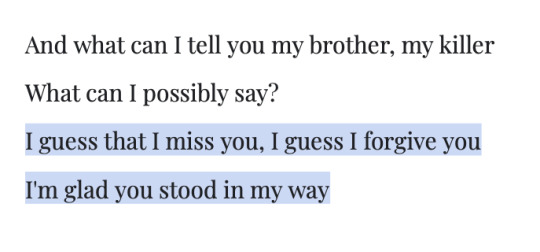
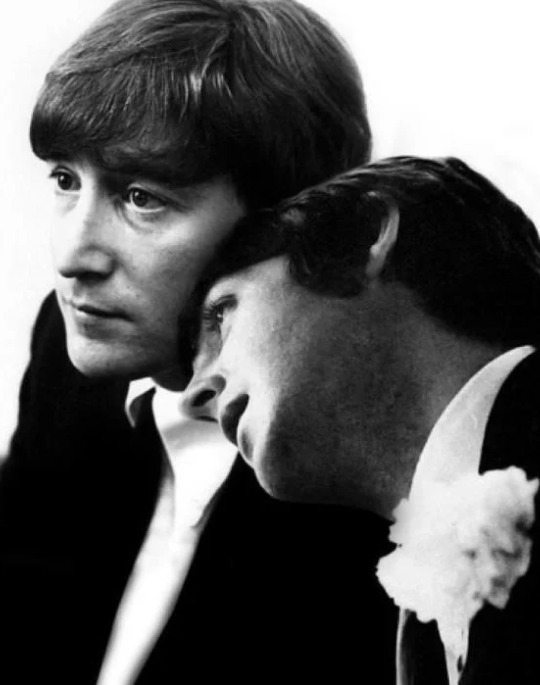
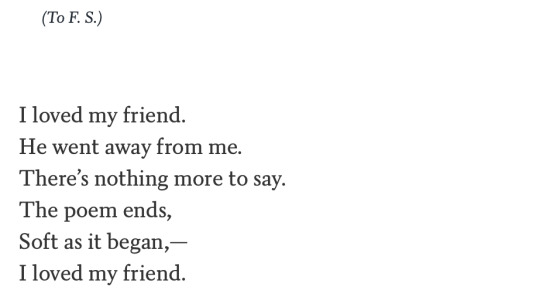
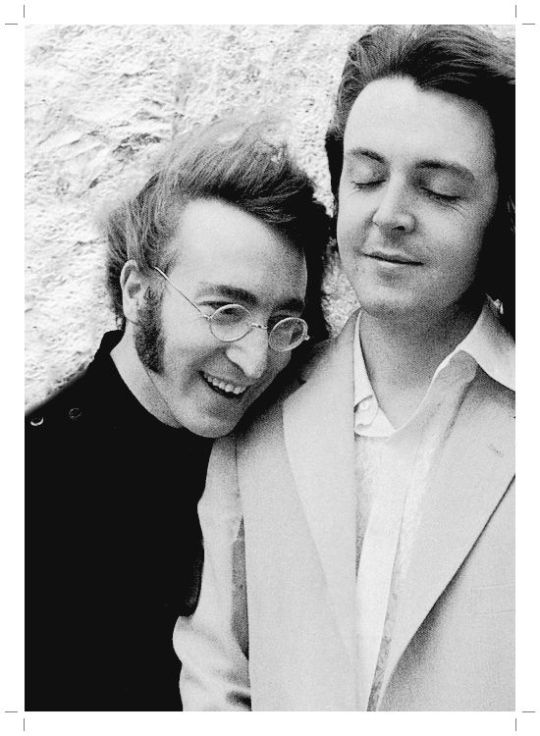
Paul McCartney and John Lennon on longing -
1. A moon or a button by Ruth Krauss 2. The Long and Winding Road: The Beatles (Lennon-McCartney) 3. Dead Poets Society (1989) dir. Peter Weir 4. Paul McCartney at Glastonbury 2022 5. Euripides, Grief Lessons: Four Plays by Euripides: tr. Anne Carson 6. A Meeting by Wendell Berry 7. Stand By Me (1986) dir. Rob Reiner 8. Paul and Linda McCartney interviewed by Joan Goodman for Playboy magazine 1984 9. The Triumph of Achilles by Louise Glück 10. Brokeback Mountain (2005) dir. Ang Lee 11. Famous Blue Raincoat by Leonard Cohen 12. I Loved My Friend by Langston Hughes
#its mclennon day fuckers get ready for me to be insufferable and crazy!!#mclennon#the beatles#web weaving#guys will be so crazy and its because they are making multiple mclennon web weaves at one time#anyways#happy mclennon day to all who celebrate#:]#stop tagging that the one photo is fake it was chosen for a reason#pls understand why i would pick photos that are doctored for this. moments that shouldve been but never were.....pls get the point#mine
385 notes
·
View notes
Text
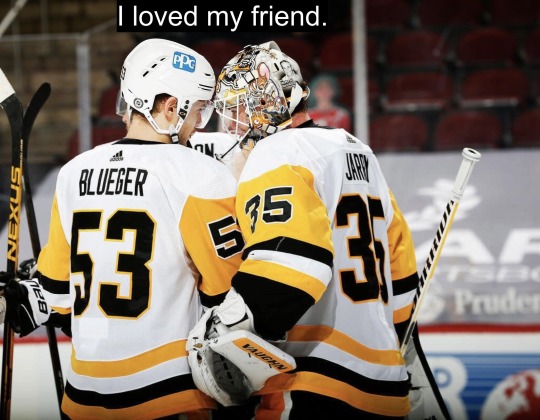





"Poem" by Langston Hughes x x x x x x x x x x x x x
For @podcasts-8-my-heart who said "DO IT" when I said a poetry edit of this poem would murder someone. Pls enjoy being murdered. Special thanks to @reavenedges-lies for sourcing a tweet for me. Alt version at podcasts-8-my-heart’s request
#pittsburgh penguins#teddy blueger#tristan jarry#hockey poetry#mine#teddy bear blue#mouse boy#but mother i love him
49 notes
·
View notes
Photo

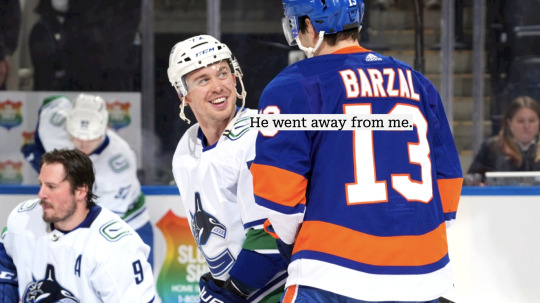
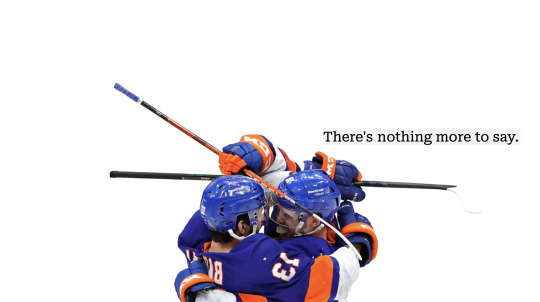

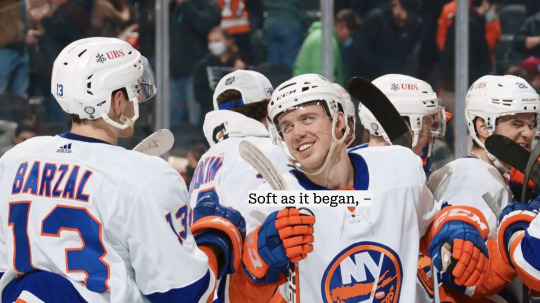
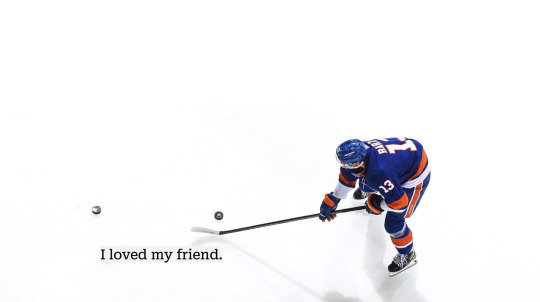
― “Poem,” Langston Hughes, The Weary Blues.
Hockey Poetry Post 8/?
(Photo credit: Mike Stobe, Mike Stobe, Sarah Stier, Mike Stobe, Len Redkoles, Mike Stobe)
#look I just really appreciate the way Barzal talks about his little heart-eyed friend#but I love that guy with- I love him so much#ok. say less.#Mathew Barzal#Anthony Beauvillier#Vancouver Canucks#New York Islanders#hockey poetry posts#I will do ANYTHING except take notes in this lecture huh
228 notes
·
View notes
Text

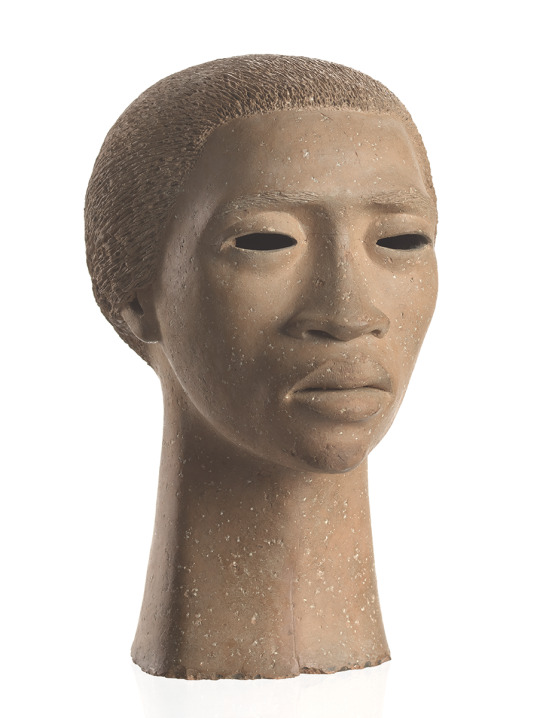
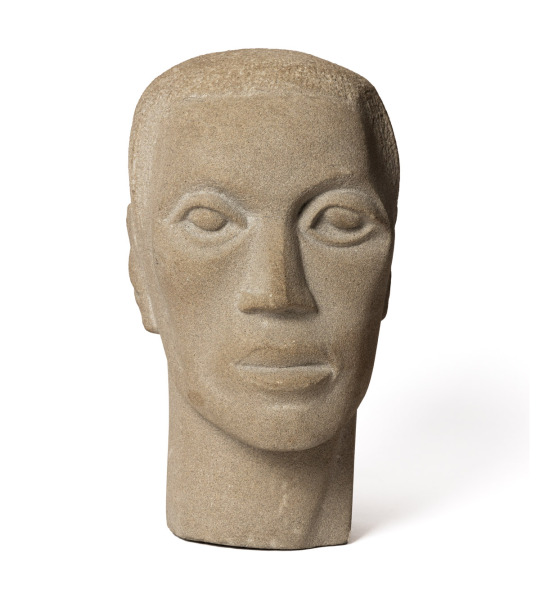
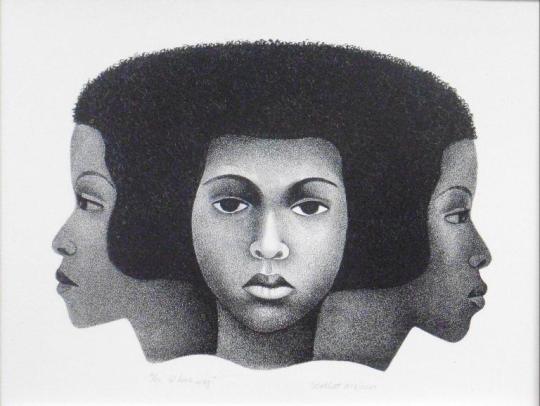
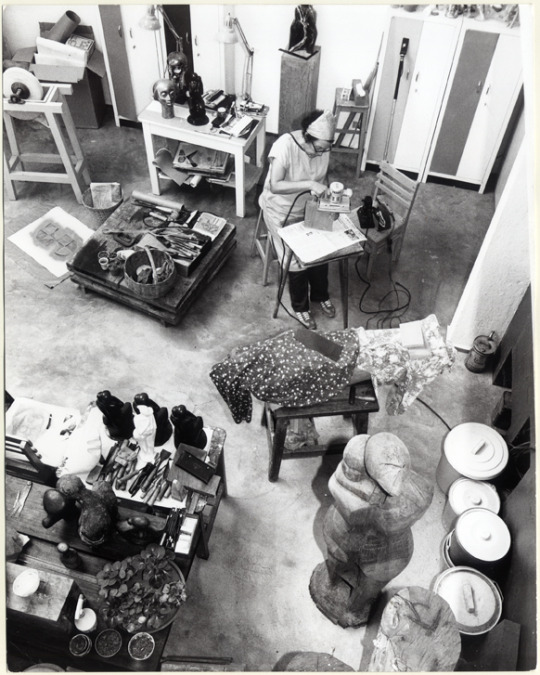
THE ARTIST & HER WORK: ELIZABETH CATLETT
Elizabeth Catlett (1915-2012) lived a storied life. From a young age, she knew she wanted to be an artist, and pursued her dreams by receiving a BA in Art from Howard University in 1935.
She married Charles White (another legacy artist), and together they moved to NYC, where their circle of friends included the likes of Loïs Mailou Jones, Charles Alston, Aaron Douglas, Jacob Lawrence, and Langston Hughes.
In 1946, the pair moved to Mexico, where Catlett was a guest artist at the printmaking collective Taller de Gráfica Popular (TGP). This was a formative time in her practice, as her work became increasingly sociopolitical. She began spending time with Diego Rivera, Frida Kahlo, and David Siqueiros and was committed to representing strength and struggle in her work. During the Red Scare of the 1950s, her activism and work with TGP came under investigation by the House Un-American Activities Committee (HUAC) and the U.S. embassy in Mexico. She was declared an "Undesirable Alien" and was prevented from returning to the States. By 2002, her citizenship was reinstated, and she became a celebrated artist around the world. Images:
Charles White. Elizabeth Catlett in her studio. c. 1942. Black-and-white photograph, 3 5/8 × 3 9/16" (9.2 × 9 cm). Private collection. © The Charles White Archives
Elizabeth Catlett (1915–2012), Head of a Negro Woman, 1946 Gift of Robert L. Johnson, © 2020 Catlett Mora Family Trust/Licensed by VAGA at Artists Rights Society (ARS), NY.
Elizabeth Catlett, Head. Carved limestone, 1943. Approximately 13 1/2x9 1/2x7 1/4 inches. (sold for $ 485,000 in 2021)
Elizabeth Catlett, "Which Way?," 1973–2003, lithograph, 11 x 14 ½ in. (27.5 x 37 cm), edition 4 of 25. Courtesy of the Elizabeth Catlett Family Trust.
Image of Elizabeth Catlett at work in her studio, circa 1983
#elizabeth catlett#women in art#female artists#20th century art#sculpture#printmaking#photography#charles white#frida khalo#diego rivera#nyc artist#mexico art#art history#black and white#artist studios#artist profile
22 notes
·
View notes
Text
Happy 8 year anniversary to my learning this poem existed.
Let America Be America Again
by Langston Hughes
Let America be America again.
Let it be the dream it used to be.
Let it be the pioneer on the plain
Seeking a home where he himself is free.
(America never was America to me.)
Let America be the dream the dreamers dreamed—
Let it be that great strong land of love
Where never kings connive nor tyrants scheme
That any man be crushed by one above.
(It never was America to me.)
O, let my land be a land where Liberty
Is crowned with no false patriotic wreath,
But opportunity is real, and life is free,
Equality is in the air we breathe.
(There’s never been equality for me,
Nor freedom in this “homeland of the free.”)
Say, who are you that mumbles in the dark?
And who are you that draws your veil across the stars?
I am the poor white, fooled and pushed apart,
I am the Negro bearing slavery’s scars.
I am the red man driven from the land,
I am the immigrant clutching the hope I seek—
And finding only the same old stupid plan
Of dog eat dog, of mighty crush the weak.
I am the young man, full of strength and hope,
Tangled in that ancient endless chain
Of profit, power, gain, of grab the land!
Of grab the gold! Of grab the ways of satisfying need!
Of work the men! Of take the pay!
Of owning everything for one’s own greed!
I am the farmer, bondsman to the soil.
I am the worker sold to the machine.
I am the Negro, servant to you all.
I am the people, humble, hungry, mean—
Hungry yet today despite the dream.
Beaten yet today—O, Pioneers!
I am the man who never got ahead,
The poorest worker bartered through the years.
Yet I’m the one who dreamt our basic dream
In the Old World while still a serf of kings,
Who dreamt a dream so strong, so brave, so true,
That even yet its mighty daring sings
In every brick and stone, in every furrow turned
That’s made America the land it has become.
O, I’m the man who sailed those early seas
In search of what I meant to be my home—
For I’m the one who left dark Ireland’s shore,
And Poland’s plain, and England’s grassy lea,
And torn from Black Africa’s strand I came
To build a “homeland of the free.”
The free?
Who said the free? Not me?
Surely not me? The millions on relief today?
The millions shot down when we strike?
The millions who have nothing for our pay?
For all the dreams we’ve dreamed
And all the songs we’ve sung
And all the hopes we’ve held
And all the flags we’ve hung,
The millions who have nothing for our pay—
Except the dream that’s almost dead today.
O, let America be America again—
The land that never has been yet—
And yet must be—the land where every man is free.
The land that’s mine—the poor man’s, Indian’s, Negro’s, ME—
Who made America,
Whose sweat and blood, whose faith and pain,
Whose hand at the foundry, whose plow in the rain,
Must bring back our mighty dream again.
Sure, call me any ugly name you choose—
The steel of freedom does not stain.
From those who live like leeches on the people’s lives,
We must take back our land again,
America!
O, yes,
I say it plain,
America never was America to me,
And yet I swear this oath—
America will be!
Out of the rack and ruin of our gangster death,
The rape and rot of graft, and stealth, and lies,
We, the people, must redeem
The land, the mines, the plants, the rivers.
The mountains and the endless plain—
All, all the stretch of these great green states—
And make America again!
2 notes
·
View notes
Text
Advice to the Able-Bodied Poet Entering the Disability Poetics Workshop - Liv Mammone
For Jennifer Bartlett and Shira Erlichman
1. Let's just save time—Yes I have seen Rain Man, The Miracle Worker, My Left Foot, or, more recently, The Theory of Everything. I wanna fuck Daniel Day Lewis too but can we not? 2. If all the the Special Needs Kids everybody's mom/cousin/friend/friend's mom/cousin's friend's mom has ever worked with got together, they could overthrow the government and we'd see some real change. Those people aren't reference points for me. There are no reference points for me. 3. This isn't the Whose Life Sucks More game. You have seen moments I can never imagine. 4. When asking about my disability, please remember you have Siri. What you really need to know will come up in the poems. 5. Similarly, if you decide you need to ask my diagnosis, I can guarantee those ugly sounding words are all I have in common with whoever you know. If you don't know anyone, asking me what does that mean isn't ingratiating. I'm not a painting by Warhol. Asterisk: if you're just meeting me and that's your opening? That, or so what happened to you—you're suspect. I have a favorite band, a gaggle of furry children. Let's start there. 6. The words disability, disorder, and disease aren't synonymous. 7. And while we're at it, let's talk about language. You're here for that above all right? Me too. But I get to decide how it's done, not you. If I say cripple, it's because I like how the consonants break like bones. I'm not handing you a membership card. If I say call me "special needs" and I'll roll over your foot, it doesn't mean that softness won't comfort others. Political correctness is kind of like using correct pronouns. So many words have been made up and thrown onto my flesh. None were my name. 8. If you didn't get the above reference to pronouns, I'll write a separate piece for you. 9. Your ear will need to curve around the rhythm of speech. Your pace will hunger to leave me limping. You will want to catch me as I lurch forward; lead me by elbow or hand; not to repeat yourself; to talk as fast as you do out there. Slow down. Slow everything down. 10. The phrase but you don't look sick can go fuck itself with a moving train covered in chainsaws. 11. Don't use the word inspiration unless you're talking about Whitman, Langston Hughes, John Keats or Jesus. 12. Matter of fact, leave Jesus out of it altogether; he's busy enough. 13. It isn't a wheelchair; it's a fully automated battle station. It isn't a cane; it's a dowsing rod. It isn't a limp; it's a swagger. It isn't a stim—it's how my fabulous self is pulling magic out of the air. 14. I'm not your metaphor. Phantom limbs, deafness, or blindness as figurative language in your poems will result in my unhinging my fucking jaw. 15. If you find yourself saying something that begins with no offense, but I want you to stop. Take a breath. And say to yourself these three sentences: Does this need to be said? Does this need to be said right now? Does this need to be said right now by me? If the answer to any of those is no, return to start do not collect $200. 16. Laugh. 17. Be honest. 18. Your head had best be a microscope. Ask yourself why you're here. But question my motives, too. Slam your hand hard on my buttons. 19. Some kind of dragon needed slaying to get to this room, whether it be the nasty bus driver or the thoughts of suicide. So somebody's probably gonna show up in pajamas, crocks, mismatched socks, un showered, hair falling loose from ponytail—whatever. Either they're embarrassed or don't give a fuck. Either way, they don't need you mentioning it. 20. Speak for me, not over me. 21. Yes, I can have sex. I hope everybody in here writes a jam so graphic it makes your goosebumps mambo just so you never ask a disabled person that ever again, unless you're offering. 22. I don't think shy people become poets, but in case you are, you best chill if you fear the body. If I'm gonna write a colostomy bag free verse or a pantoum about how hard it is to negotiate my period on crutches, I wanna do it in peace. 23. You need Advil? Guaranteed, somebody got you. 24. If I have to leave the room while you're reading, sorry in advance. 25. Let me point out, Tiny Tim has been fucking me over since 1843. If I'm happy, it's taken for a miracle; if I'm not, I remind them of all they have and all the work they have to do. I could be a big smile, a raised fist, an eye glittered with tears. 26. This is the place I come to sharpen my teeth; to weep until I am the Danube. I don't care if you're frightened. 27. Trigger warnings. That is all. 28. Halle Berry, Harriet Tubman, Orlando Bloom, Clinton, Christie, Darwin. A lot of your faves are disabled. Just like a lot of your faves are actually bisexual. (More breaking news at 11.) 29. And while we're on that, being disabled doesn't mean you've checked off your minority box on the form. Just saying. 30. I don't want to talk about me; how's my stanza structure? 31. Intersectionality isn't a buzzword. 32. I will ask if I need your help. Repeat this a billion times. 33. Related note: you wouldn't grab someone on the subway. You'd let your face smash into the pole before steadying yourself on the person next to you. So why in the name of God's teeth would you touch me or whatever apparatus I may have without asking?! 34. Remember, you're one slip in the shower, doctor's visit, missed turn away from being me. 35. If I fall, the way you gasp hurts worse than impact. 36. I'm not blaming you. I'm saying pay attention. 37. Inevitably, someone will be forced to stop coming. Email them; that'd be cool. 38. Even if you pity me, don't mess around when it comes to editing. 39. Your body is so damn fucking beautiful. It's like nothing else. 40. Please remember that compliance with any or all of the aforementioned will not result in praise of any kind, cookies, medals, or otherwise. Thank you. 41. People are like poems. They don't get finished, they just stop.
13 notes
·
View notes
Text
Hoodoo Veneration Days in February 2023

The 2023 Hoodoo's Calendar recognizes these Hoodoo Saints & Elevated Ancestors on the following dates in the Month of February:
2/1 Langston Hughes (B-day)
2/3 Mother Mary Elizabeth Lange (D-day)
2/4 Rosa Parks (B-day)
2/8 Dr. Rebecca Lee (B-day)
2/14 Fredrick Douglass' (B-Day [observed])
2/17 Fredricka & Huey P. Newtons' (B-day)
2/18 Queen Mother Toni Morrison B-Day
2/23 W.E.B. Dubois (B-Day)
2/27 Vodou Charlie's (D-Day)
On the birthdays/death days of Elevated Ancestors and Hoodoo Saints, consider pouring libations or researching their stories as a way of venerating them. Lift them up in prayer. Share their story. Do for them what you would want the living collective of Hoodoos to do for you.
🌟 FINAL copies of The2023 Hoodoo's Calendar are available for purchase (once sold out, that's it)! Subscribe to the official e-newsletter for the latest updates & exclusive content access. https://thehoodoocalendar.square.site 🌟
#ancestors#hoodoosaints#elevatedancestors#veneration#hoodoo#hoodoos#hoodoo culture#libations#The Hoodoo Calendar#death days#birth days
30 notes
·
View notes
Photo
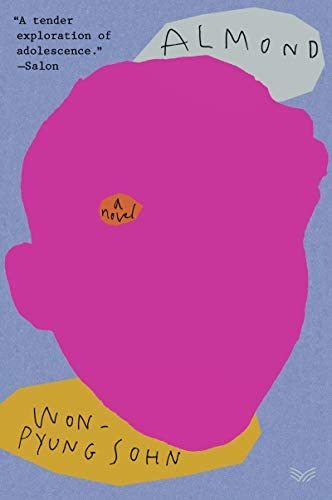
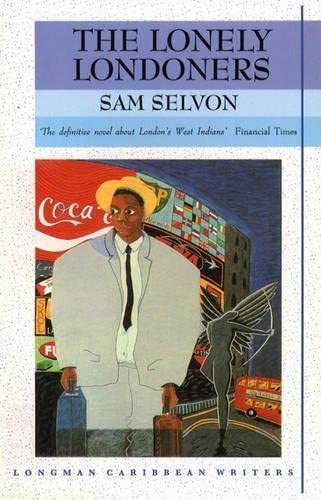



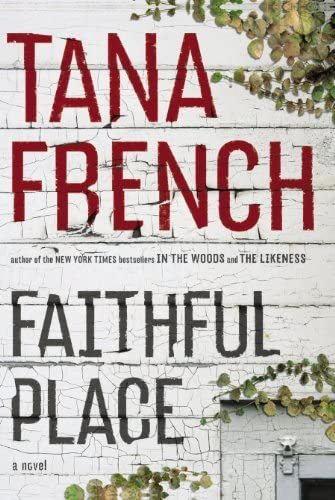


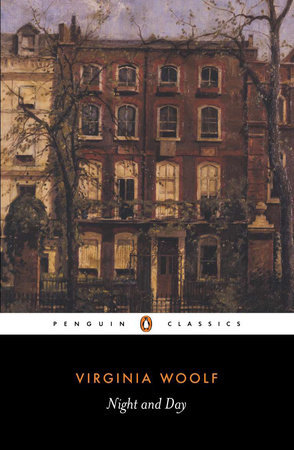

(some of) my top books of 2022: prose edition
Last year I made a post with some of my favorite books, using first lines and bullet points. This year I read about twice as many books, so this certainly won’t cover all of them, but it’s a selection -- and I’ll make a separate post for the poetry.
1. Almond by Won-Pyung Sohn (trans. Sandy Joosun Lee)
I won’t tell you whether it has a happy ending or a tragic ending. Because, first of all, every story becomes boring once the ending is spoiled. Second of all, not telling you will make you more engaged in this one.
you should read it if you like:
coming of age novels
thinking about what makes humans human
delicate character development
2. The Lonely Londoners by Sam Selvon
One grim winter evening, when it had a kind of unrealness about London, with a fog sleeping restlessly over the city and the lights showing in the blur as if is not London at all but some strange place on another planet, Moses Aloetta hop on a number 46 bus at the corner of Chepstow Road and Westbourne Grove to go to Waterloo to meet a fellar who was coming from Trinidad on the boat-train.
you should read it if you like:
novels about city life
vibrant prose
thinking about the immigrant experience
3. The Memory Police by Yoko Ogawa (trans. Stephen Snyder)
I sometimes wonder what was disappeared first -- among all the things that have vanished from the island.
you should read it if you like:
stories of loss and memory
elegant allegory
books that leave you with a haunted, desolate feeling
[note: this was my first book of the year, and i kind of worry that’s why 2022 went the way it did...]
4. The Stone Face by William Gardner Smith
He leaned forward on the edge of his seat, his chin in his palms and his elbows on his knees, rocking imperceptibly to the movement of the train. It was evening, and in the fading light beyond the window the flat green-and-brown French farmland hurried by. He found his lips almost forming a prayer; not in words, not to a God, but in an emotion reaching out to the earth, the sky, to the world in general.
you should read it if you like:
books that face head on the question of our duty and responsibility to fight for a more just world
nuanced, empathetic explorations of people and relationships
powerful, vivid prose
5. The True Deceiver by Tove Jansson (trans. Thomas Teal)
It was an ordinary dark winter morning, and snow was still falling. No window in the village showed a light. Katri screened the lamp so she wouldn't wake her brother while she made coffee and put the Thermos beside his bed.
you should read it if you like:
quiet, understated books
seeing unexpected human connection
books that inhabit nature and the seasons
6. Faithful Place by Tana French
In all your life, only a few moments matter. Mostly you never get a good look at them except in hindsight, long after they've zipped past you: the moment when you decided whether to talk to that girl, slow down on that blind bend, stop and find that condom. I was lucky, I guess you could call it. I got to see one of mine face-to-face, and recognize it for what it was.
you should read it if you like:
long-buried secrets
characters haunted by the past
some really messy families
7. The Glass Palace by Amitav Ghosh
There was only one person in the food-stall who knew exactly what that sound was that was rolling in across the plain, along the silver curve of the Irrawaddy, to the western wall of Mandalay's fort.
you should read it if you like:
sprawling multi-generational tales
intricate, atmospheric historical novels
thinking about the complex entanglements of people and events within history
8. I Wonder as I Wander by Langston Hughes
When I was twenty-seven the stock-market crash came. When I was twenty-eight, my personal crash came. Then I guess I woke up. So. when I was almost thirty, I began to make my living from writing. This is the story of a Negro who wanted to make his living from poems and stories.
you should read it if you like:
literary memoirs
a way of approaching things with humor
seeing the 1930s across europe, asia, and the US brought vividly to life
9. Night and Day by Virginia Woolf
It was a Sunday evening in October, and in common with many other young ladies of her class, Katharine Hilbery was pouring out tea. Perhaps a fifth part of her mind was thus occupied, and the remaining parts leapt over the little barrier of day which interposed between Monday morning and this rather subdued moment, and played with the things one does voluntarily and normally in the daylight.
you should read it if you like:
careful psychological studies
stories of 20-somethings figuring out their feelings
prose that flows like butter
10. Noon, 22nd Century by Arkady and Boris Strugatsky
Когда рыжий песок под гусеницами краулера вдруг осел, Петр Алексеевич Новаго дал задний ход и крикнул Манделю: «Соскакивай!» Краулер задергался, разбрасывая тучи песка и пыли, и стал переворачиваться кормой кверху. [When the orange sand under the crawler’s tracks suddenly subsided, Pyotr Alekseevich Novago backed up and shouted to Mandel: “Hop off!” The crawler shuddered, tossing up clouds of sand and dust, and began to turn stern-up.]
you should read this if you like:
hopeful sci-fi
stories about friendship
thinking about humanity’s first steps towards alien encounter
[note: this is available in english as a pdf online, i’ve checked]
looking back, are there any running themes? perhaps whether humans are by and large good, or when they are capable of goodness. finding connection, sometimes against great odds. an even mix of stories about leaving home and stories about staying there. covers that have people on them?
stayed tuned for pt. 2: poetry edition!
24 notes
·
View notes
Note
hey cup :3 Im trying to make a mini comic for a games and Im looking for some inspiration. What are some poems\poets you like and recommended? :D I love your writing and I bet you got great tastes
OMGGG. Okay i will list my favorite poems and poets. I canf wait to see the comics if u post them or anything. It's gonna be below cut So thr post isn't too long.
Poets i like: Olivia gatwood, robert frost, Edgar Allen poe, Emily Dickens, ts Eliot, ollie schminkey, ee Cummings, my mutual @/thegirlhoodtheory on tumblr, donika kelly. These are just a few.
Poems:
1. Ode to the women on long Island - olivia gatwood
2. People you may know - Kevin kantor
3. Hope is a thing with feathers - Emily dickens
4. The lovesong of j Alfred prufrock - ts eliot
5. Lenore - poe
6. The beast -Sylvia plath
7. Song of the open road - Walt whitman
8. Mother to son Langston Hughes
9. Dead dad jokes - ollie schminkey
10. Living with depression - Dan Roman
11. The bestiary (book) - donika kelly
If you need any tws let me know.
3 notes
·
View notes
Photo

Harry Belafonte | Marching in Selma and always towards freedom for all
How fortunate for me that the performing arts became the catalyst that fueled my desire for social change. In its pursuit I came upon fellow artists, like the great actor – and my hero – singer-humanist Paul Robeson, painter Charles White, dancer Katherine Dunham. Historian's superior academic mind, Dr. W.E.B. Du Bois. Social strategist and educator Eleanor Roosevelt. Writers Langston Hughes and Maya Angelou and James Baldwin. They all inspired me. They excited me. Deeply influenced me. And they were also my moral compass. It was Robeson who said, as you heard in the film earlier, "Artists are the gatekeepers of truth. They are civilization's radical voice." This Robeson-environment sounded like a desired place to be and given the opportunity to dwell there has never disappointed me.
https://www.nytimes.com/2016/11/07/opinion/campaign-stops/harry-belafonte-what-do-we-have-to-lose-everything.html
“O, yes,
I say it plain,
America never was America to me,
And yet I swear this oath —
America will be!”
— Langston Hughes, “Let America Be America Again”
What old men know is that everything can change. Langston Hughes wrote these lines when I was 8 years old, in the very different America of 1935.
It was an America where the life of a black person didn’t count for much. Where women were still second-class citizens, where Jews and other ethnic whites were looked on with suspicion, and immigrants were kept out almost completely unless they came from certain approved countries in Northern Europe. Where gay people dared not speak the name of their love, and where “passing” — as white, as a WASP, as heterosexual, as something, anything else that fit in with what America was supposed to be — was a commonplace, with all of the self-abasement and the shame that entailed.
It was an America still ruled, at its base, by violence. Where lynchings, and especially the threat of lynchings, were used to keep minorities away from the ballot box and in their place. Where companies amassed arsenals of weapons for goons to use against their own employees and recruited the police and National Guardsmen to help them if these private corporate armies proved insufficient. Where destitute veterans of World War I were driven from the streets of Washington with tear gas and bayonets, after they went to our nation’s capital to ask for the money they were owed.
Much of that was how America had always been. We changed it, many of us, through some of the proudest struggles of our history. It wasn’t easy, and sometimes it wasn’t pretty, but we did it, together. We won voting rights for all. We ended Jim Crow, and we pushed open the Golden Door again to welcome immigrants. We achieved full rights for women, and fought to let people of all genders and sexual orientations stand in the light. And if we have not yet created the America that Langston Hughes swore will be — “The land that never has been yet” — if there is still much to be done, at least we have advanced our standards of humanity, hope and decency to places where many people never thought we could reach.
What old men know, too, is that all that is gained can be lost. Lost just as the liberation that the Civil War and Emancipation brought was squandered after Reconstruction, by a white America grown morally weary, or bent on revenge. Lost as the gains of our labor unions have been for decades now, pushed back until so many of us stand alone in the workplace, before unfettered corporate power. Lost as the vote is being lost by legislative chicanery. Lost as so many powerful interests would have us lose the benefits of the social welfare state, privatize Social Security, and annihilate Obamacare altogether.
If he wins this Tuesday, Donald J. Trump would be, at 70, the oldest president ever elected. But there is much about Mr. Trump that is always young, and not in a good way. There is something permanently feckless and immature in the man. It can be seen in how he mangles virtually the same words that Langston Hughes used.
When Hughes writes, in the first two lines of his poem, “Let America be America again/ Let it be the dream it used to be,” he acknowledges that America is primarily a dream, a hope, an aspiration, that may never be fully attainable, but that spurs us to be better, to be larger. He follows this with the repeated counterpoint, “America never was America to me,” and through the rest of this remarkable poem he alternates between the oppressed and the wronged of America, and the great dreams that they have for their country, that can never be extinguished.
Mr. Trump, who is not a poet, either in his late-night tweets or on the speaker’s stump, sees American greatness as some heavy, dead thing that we must reacquire. Like a bar of gold, perhaps, or a bank vault, or one of the lifeless, anonymous buildings he loves to put up. It is a simplistic notion, reducing all the complexity of the American experience to a vague greatness, and his prescription for the future is just as undefined, a promise that we will return to “winning” without ever spelling out what we will win — save for the exclusion of “others,” the reduction of women to sexual tally points, the re-closeting of so many of us.
With his simple, mean, boy’s heart, Mr. Trump wants us to follow him blind into a restoration that is not possible and could not be endured if it were. Many of his followers acknowledge that (“He may get us all killed”) but want to have someone in the White House who will really “blow things up.”
What old men know is that things blown up — customs, folkways, social compacts, human bodies — cannot so easily be put right. What Langston Hughes so yearned for when he asked that America be America again was the realization of an age-old people’s struggle, not the vaporous fantasies of a petty tyrant. Mr. Trump asks us what we have to lose, and we must answer, only the dream, only everything.
OpEd | November 7, 2016
Harry Belafonte: What Do We Have to Lose? Everything
https://www.nytimes.com/2020/11/02/opinion/harry-belafonte-donald-trump.html
The polls suggest, we are told, that Mr. Trump has made some small inroads in our vote, that a higher percentage of young Black men will vote for him in 2020 than did in 2016. I have difficulty crediting this. But if it is so, I would urge my brothers to listen better. Not just to the false promises Mr. Trump makes to us, but also at what he says when he is “alone in the room” with his white supporters, promising them at his rallies that if he is re-elected, people of color will not invade their “beautiful suburbs” from our “disgusting cities.”
Mr. Trump is too late. We are everywhere in America. We are in the bone and the blood and the root of the country. We are not going anywhere, certainly not to some fantasy of a new “separate but equal” segregation, we in “our” cities, white people in “their” suburbs.
Perhaps the president is confused by how the Rev. Dr. Martin Luther King Jr., in his greatest speech, referred to the words of the Declaration of Independence and the Constitution as a “promissory note to which every American is to fall heir.” Perhaps that gave Mr. Trump the idea that this was all about money. Surely, money — the household stake, the money with which to buy a home, secure a good education, start a family — was a vital goal of the movement then, just as the need for Black people to be made whole, after all the years of slavery and Jim Crow, is still a pressing need today.
But I was there with Dr. King that day, over a half-century ago, in the shadow of Lincoln’s statue, and what he spoke of was “the riches of freedom and the security of justice.” He quoted the most fundamental promise of the Declaration, that all of us have “certain unalienable Rights” — among them “Life, Liberty and the pursuit of Happiness.”
It seems strange that we must still agitate for these basic rights, or that Mr. Trump thinks he is being magnanimous when he offers them to us again as last-minute campaign promises — so long as we stay in our place. In the past, we have turned the wheel in great bursts of energy and faith, and in between, when we stood exhausted and bloodied, there was some sliding back. That is always how it is in a democracy and a people’s movement, but now is the time to move forward again.
Four years ago, faced with the prospect of a Trump presidency, I wrote that what old men know is how quickly things can change. Well, I am still old but I am also still here, at 93, and for all the bitter lessons we have learned from Mr. Trump’s term in office, I can tell you that the wheel is turning again. That we have never had so many white allies, willing to stand together for freedom, for honor, for a justice that will free us all in the end, even those who are now most fearful and seething with denial.
3 notes
·
View notes
Text
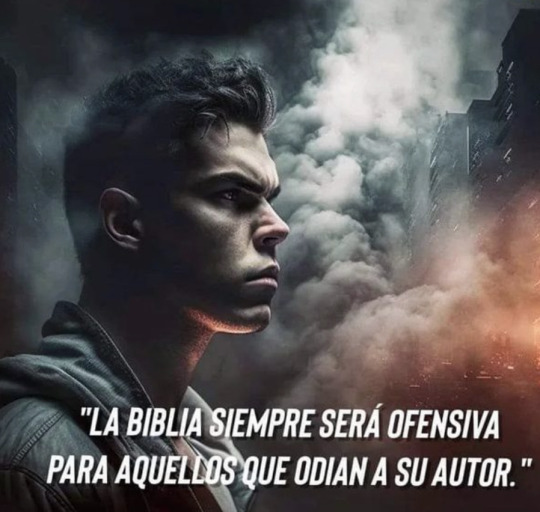
꧁ Alentados en Dios꧂
3 de marzo de 2022
La Biblia en un año: Números 28–30; Marcos 8:22-38
Entonces se levantó Jonatán hijo de Saúl y vino a David […], y fortaleció su mano en Dios (v. 16).
Lee por favor: 1 Samuel 23:15-24
En 1925, Langston Hughes, un aspirante a escritor que trabajaba de ayudante de camarero en un hotel, se enteró de que un poeta al que admiraba, Vachel Lindsey, se hospedaba allí. Tímidamente, le pasó algunas de sus poesías, las cuales Lindsey elogió con entusiasmo en una lectura pública. Ese aliento hizo que Hughes recibiera una beca universitaria, abriéndole camino a su propia carrera exitosa como escritor.
Un pequeño aliento puede recorrer un largo camino; en especial, cuando Dios está en él. La Escritura narra un incidente cuando David huía del rey Saúl, quien trataba de matarlo. Jonatán, el hijo de Saúl, lo buscó «y fortaleció su mano en Dios. Y le dijo: No temas, pues no te hallará la mano de Saúl mi padre, y tú reinarás sobre Israel» (1 Samuel 23:15-17).
Jonatán tenía razón. David sería rey. La clave del aliento eficaz de Jonatán está en la sencilla frase «en Dios» (v. 16). Por medio de Jesús, Dios nos da «buena esperanza» (2 Tesalonicenses 2:16).
Estamos rodeados de personas que necesitan el aliento que da Dios. Si las buscamos, como hizo Jonatán, y las guiamos al Señor con una palabra o acción bondadosa, Él hará el resto. Sin importar lo que traiga aparejado esta vida, un futuro brillante y eterno les aguarda a los que confían en Dios.
-James Banks
Así es, estamos rodeados de personas que necesitan a nuestro Señor Jesucristo, hay personas que sabiendo de Dios y necesitándolo ponen “SU FE” en santos y virgenes o en el peor de los casos al enemigo y la muerte menospreciando el amor y el poder de Cristo, no quieren reconocer a Dios pues para ellos es un compromiso, el diablo se aprovecha y obra en los hijos de desobediencia poniendo a su alcance alcohol, drogas, pornografia y mil cosas más, a ellos debe llegar el consuelo, la doctrina y el evangelio, recibe hoy esta palabra y si quieres y puedes compártela a quienes crean que la necesitan, que tengas un maravilloso día y que Dios te bendiga, shalom!
Reflexiona y ora:
¿Cómo te alentó alguien de forma especial en tu andar en la fe?
¿Cómo puedes fortalecer la fe de alguien hoy?
Dios, dame oportunidades de ayudar a otros a encontrar nueva fuerza en ti.
#kairosnanchital#sanregino#cristo#ka1rosnan#nanchital#iglesiaapostolica#el triunfo#el triunfonanchital#eltriunfo#iglesiaapostólica#jesucristo#espíritu santo#sanregino ka1rosnan#youtube#kairos#amor
4 notes
·
View notes
Text

Nora Douglas Holt (November 8, 1885 - January 25, 1974) was an important figure in the history of Black music in Chicago in the 1930s and was a noted musician, composer, and renowned singer and performer during the Harlem Renaissance in the 1940s.
While employed as a music critic for the Chicago Defender (1917-21) she co-founded the Chicago Music Association and the National Association of Negro Musicians. She edited and published Music and Poetry, a magazine for Black musicians. She was a music critic for the New York Amsterdam News and was the first African American inductee into the Music Critics Circle of New York.
Born in Kansas City, Kansas, she was the daughter of Rev. C.N. Douglas, an AME pastor, and Grace Brown Douglas. She studied piano and played the organ for her father’s church. She graduated valedictorian from Western University in Kansas with a BA in Music, she earned an MA in Music Composition from the Chicago Musical College, the first African American to do so. Her MA thesis was titled, “Rhapsody on Negro Themes.”
She returned to the US, settled in Los Angeles, and enrolled at USC, studying to become a teacher. She taught music in the public school system and became involved with the Los Angeles Unified School District. She opened her beauty salon, an enterprise that became a huge success.
She continued to perform and compose. Besides her show at Walroys Gallery in Los Angeles, she co-composed with Thelma Brown and writer, Langston Hughes, the song “Ethiopia Marches On” in support of Ethiopia’s resistance against Fascist Italy’s occupation of their country in 1935. By the 1940s she was living in New York City and she began working as a music critic for the New York Amsterdam News. She hosted an annual “American Negro Artists” festival on WNYC radio and was the musical director and producer of the “Nora Holt’s Concert Showcase” on WLIB radio, in New York City. She was part of the “First World Festival of Negro Arts” in Dakar, Senegal.
Of the more than 200 works of chamber and orchestral music that Nora wrote, all but two were stolen, “Negro Dance” and “Sand Man.” #africanhistory365 #africanexcellence
0 notes